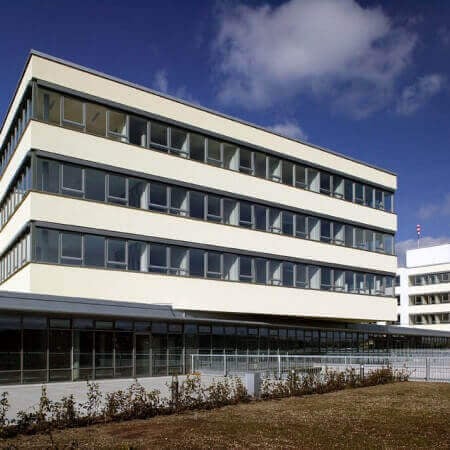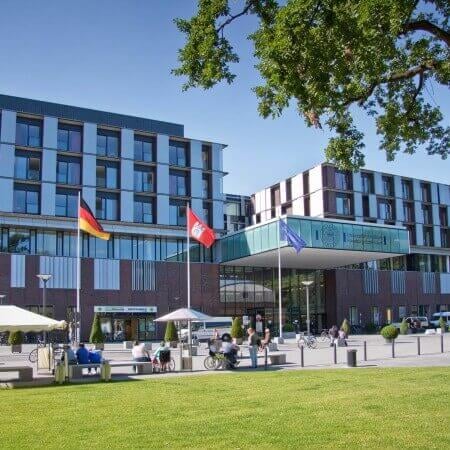A salivary gland abscess is a collection of pus that must be removed in order to avoid severe complications. You can opt to undergo your treatment of salivary gland abscess in Germany because in this country it is reliable, safe, and minimally traumatic. German doctors successfully combine conservative therapy with surgical interventions. The specialists take measures to completely eliminate the abscess and prevent its recurrence. You are welcome to make your treatment appointment in one of the German hospitals through the Booking Health service and will receive top-class medical services at a favorable price.
Content
- What is a salivary gland abscess?
- Surgical treatment
- Conservative therapy
German doctors deal with the treatment of a salivary gland abscess using surgical opening and drainage. They also simultaneously use antibiotic therapy to destroy the causative agent of the infection.
You can undergo your treatment in one of the following hospitals: University Hospital of Ludwig Maximilian University of Munich, University Hospital Ulm, or University Hospital Frankfurt am Main.
Please contact the Booking Health specialists and we will arrange your trip. You will receive comprehensive information about the specialized clinics and treatment methods and you will be able to compare prices for treatment in different medical centers. Our specialists will help you to apply for a visa, provide you with medical insurance, book your airline tickets, and help you to get to the clinic. An interpreter will accompany you to the clinic. As a patient of the Booking Health company, you will receive treatment at the same price as German citizens do.
What is a salivary gland abscess?
A salivary gland abscess is a rare disease and involves the formation of a purulent cavity inside the corresponding organ. The parotid salivary gland is most commonly affected.
The abscess is usually a secondary condition. For example, it can be the attachment of a bacterial infection to a viral inflammation of the salivary gland or the spread of pharyngitis: the penetration of a bacterial infection from the pharynx into the salivary gland. Less commonly, an abscess develops as a primary condition, for example, due to stones in the salivary gland ducts.
The disease is dangerous, and if left untreated, can lead to severe complications. In the thicker part of the salivary gland, the facial nerve passes, which, in an unfavorable outcome of the disease, will be irreversibly damaged. Breakthroughs of the abscess on the skin, in the middle ear, and on the external auditory canal are also possible. The abscess can transform into a more severe inflammation called phlegmon, which spreads to the soft tissues of the oral cavity, neck, and mediastinum.
Therefore, abscess treatment should be timely. This includes conservative therapy and surgical opening of the abscess (with drainage). Sometimes, the salivary gland has to be removed completely.
Surgical treatment
In cases of salivary gland abscesses, surgical treatment is almost always performed. In most cases, conservative antibiotic therapy alone does not lead to recovery, and even if the abscess disappears, it may develop in the same place in the future.
German doctors perform the drainage of a salivary gland abscess. They evacuate the pus, wash the cavity with antiseptics, and also leave the drainage in the wound. The drainage is a thin tube through which the pus flows. After a few days, when the inflammatory fluid is no longer secreted, the doctor will remove the drain and close the wound.
There are several reasons for you to have this operation in Germany:
- short incisions;
- minimal trauma rate and rapid rehabilitation;
- good aesthetic and functional outcomes;
- preservation of the salivary gland to avoid a dry mouth;
- simultaneous treatment of concomitant diseases that could cause the development of an abscess, for example, salivary stone disease;
- low risk of complications;
- high-quality postoperative care and monitoring;
- low risk of abscess recurrence.
Conservative therapy
Conservative treatment is used to help complement surgery, it:
- accelerates wound healing;
- reduces the risk of spreading infection;
- completely destroy the bacteria in the salivary gland in order to prevent the recurrence of the disease even in the far future.
Antibiotic therapy is the basis of conservative treatment for a salivary gland abscess. Since this disease is caused by bacteria, antibiotics are required to eliminate them. Initially, antibiotic therapy is prescribed empirically. Doctors do not know exactly which pathogen caused the disease, so they use broad-spectrum drugs. Antibiotics are usually taken by mouth. However, with the signs of intoxication available, if the doctor suspects the spread of an infection in the body, he may resort to the intravenous administration of drugs in the first days of treatment. After achieving the first clinical results, patients will switch to oral antibiotics.
After the removal of the pus from the abscess cavity, bacteriological diagnostics are performed. The material is placed in a nutrient medium, and bacteria grow on it. Doctors identify them and assess their sensitivity to various antibiotics. This procedure is especially important for the treatment of patients whose abscesses recur after surgery. Sometimes, this is also useful in primary treatment: for example, if the prescribed antibiotics do not work, then, after receiving the results of the antibiogram, the treatment regimen is changed to get better results.
If you develop a salivary gland abscess, you can travel to Germany for the treatment of this disease. You are welcome to use the Booking Health service to clarify the cost of treatment and book your treatment at a clinic. Our experts will help you to select the best clinics in Germany and reduce the waiting period before the start of your treatment. We will take care of the organization of your trip to one of the German medical centers.
Authors:
The article was edited by medical experts, board certified doctors Dr. Nadezhda Ivanisova and Dr. Sergey Pashchenko. For the treatment of the conditions referred to in the article, you must consult a doctor; the information in the article is not intended for self-medication!
Sources:
WHO - World Health Organization
NHS
PubMed




















